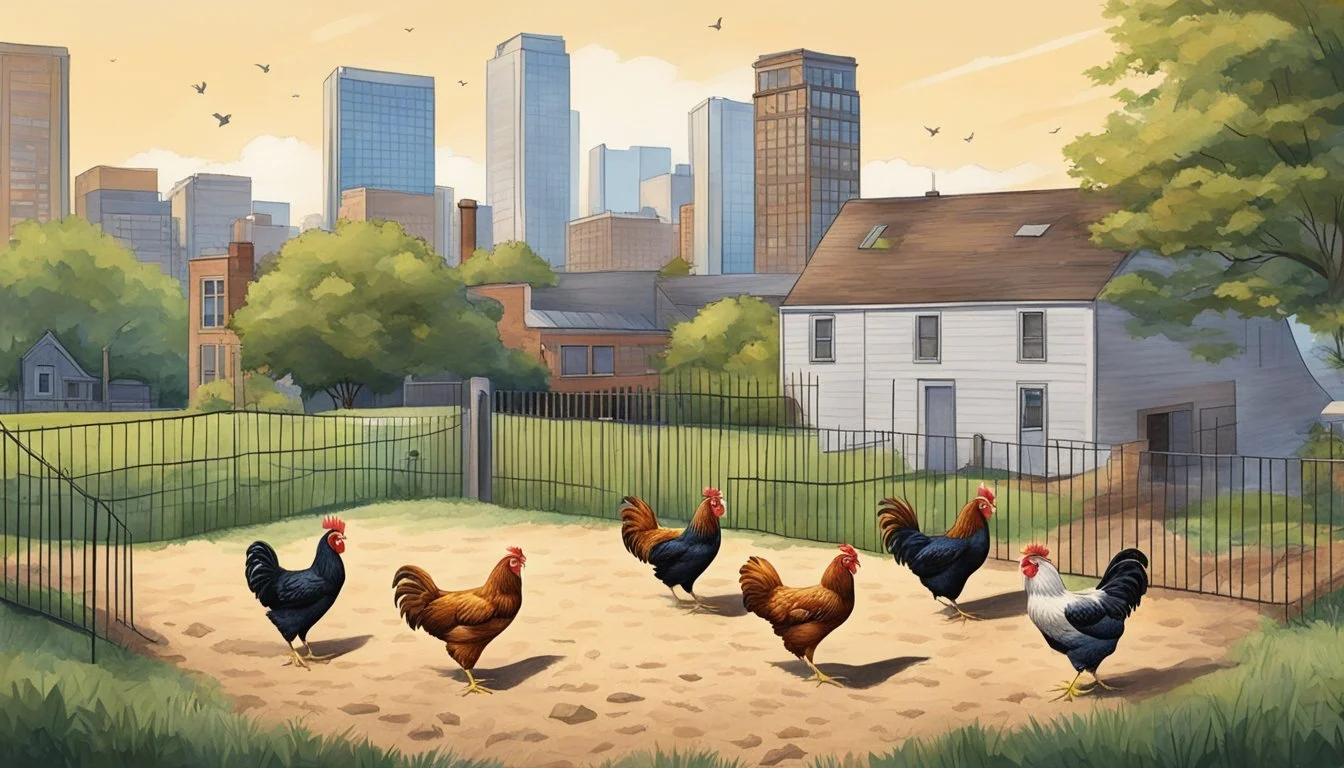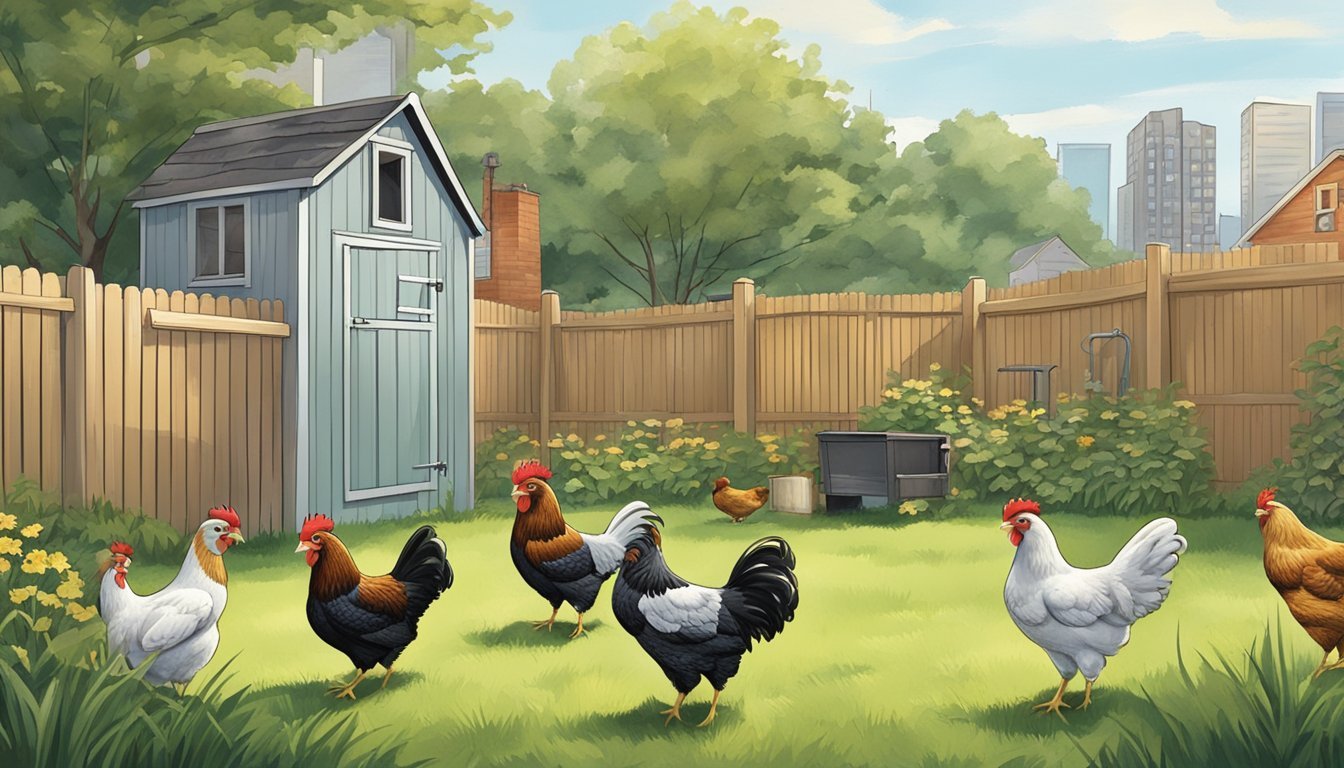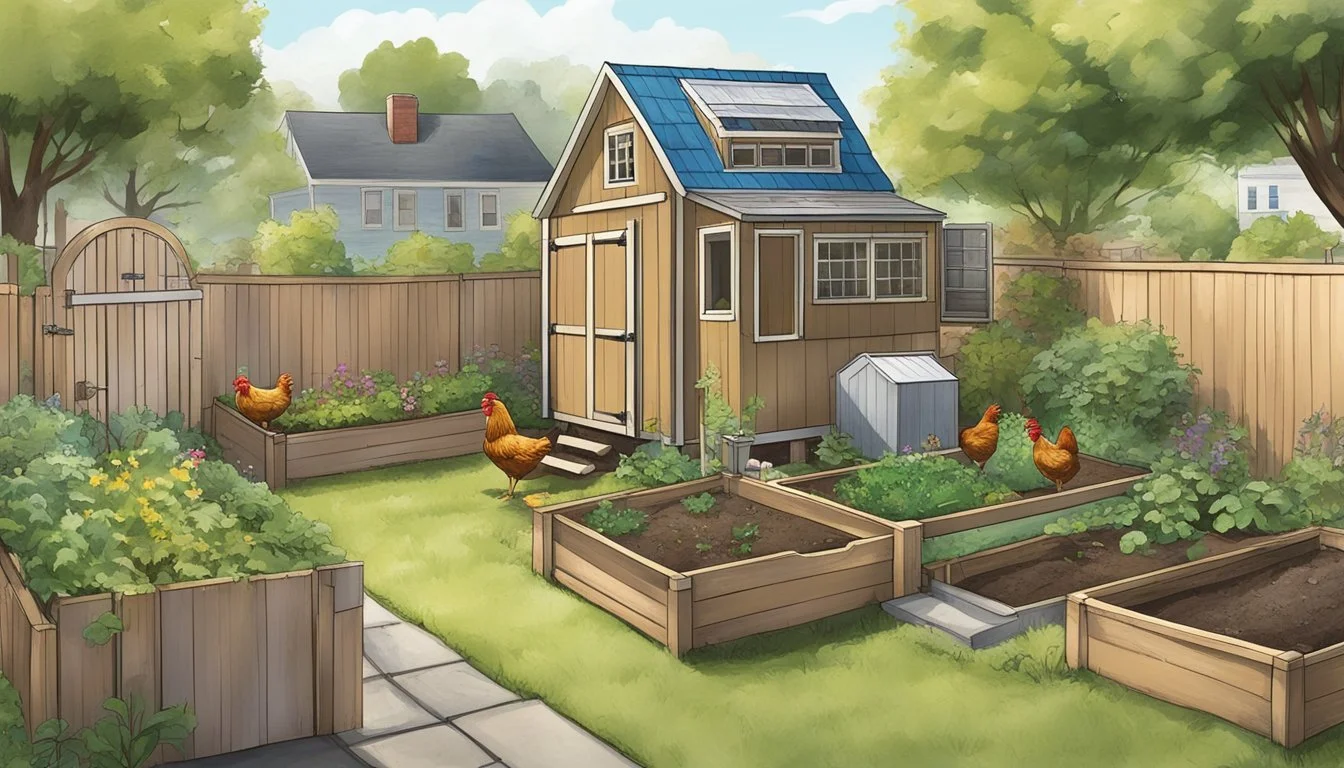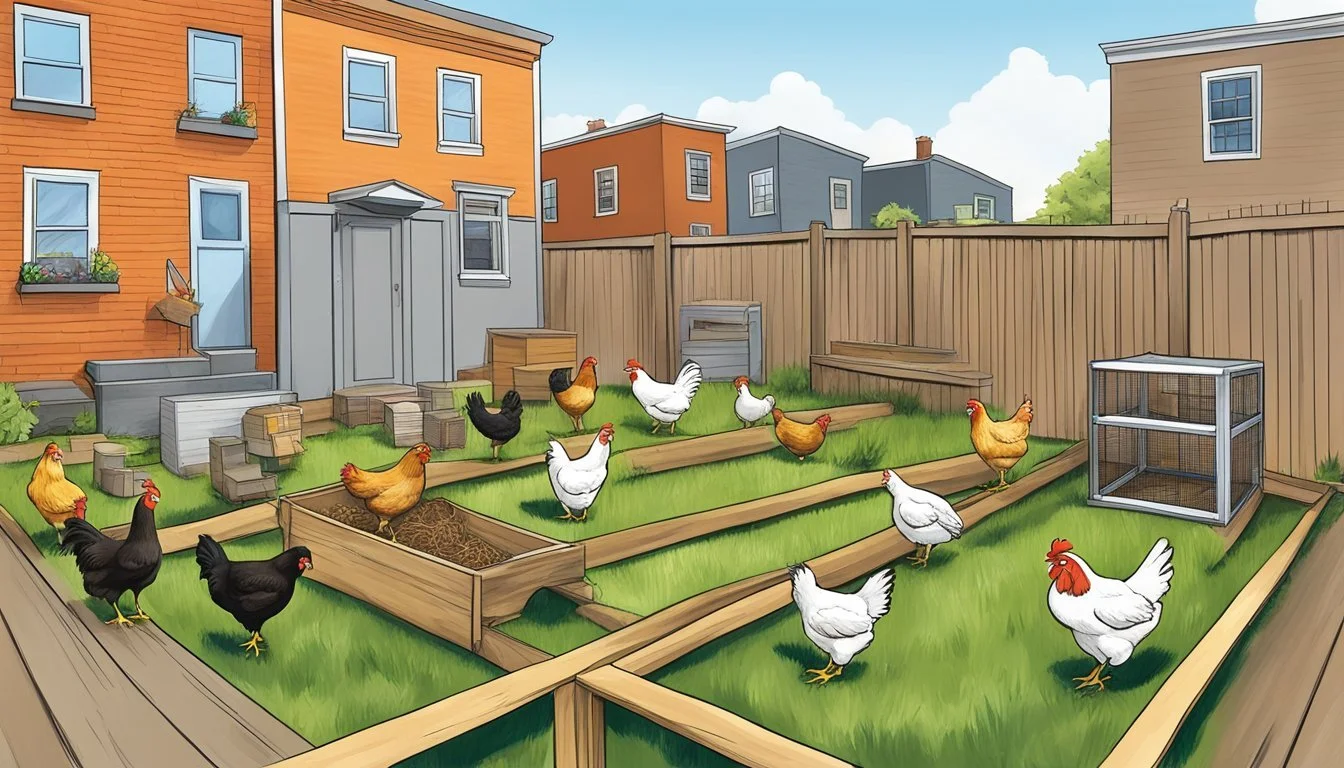Keeping Backyard Chickens in Baltimore, MD
Essential Tips for Urban Poultry Farming
Urban homesteading has taken a delightful turn in Baltimore, Maryland, with the integration of backyard chickens into the city life. Residents of Baltimore are allowed to keep chickens on their properties, embracing the joys and benefits of urban poultry farming. The city has recognized the value that these birds bring to households, not just as pets, but also as providers of fresh eggs and natural garden composting agents. This aligns with a growing movement towards self-sufficiency and sustainable living, where citizens are looking for ways to connect with their food sources and promote local agriculture, even in an urban setting.
However, keeping backyard chickens in Baltimore comes with its own set of regulations designed to ensure the welfare of the chickens and to mitigate any potential issues with neighbors and the community. These city-specific rules mandate the distance of chicken coops from neighboring homes and the maximum number of chickens allowed, particularly on smaller properties. For Baltimore residents, it's essential to understand these local laws, which include coop construction standards and property size considerations, to make the experience of keeping chickens positive for both the chickens and the community.
In addition to local ordinances, Maryland state law requires chicken keepers to register with the Maryland Department of Agriculture. This statewide registry ensures that all poultry, including chickens, ducks, geese, and even pigeons, are accounted for, which is crucial for disease control and public health monitoring. The state's involvement underscores the importance of responsible animal husbandry and underscores the community's commitment to maintaining appropriate standards for backyard chickens in an urban environment.
Legal Framework for Raising Chickens
The legal framework for raising chickens in Baltimore, MD, is defined by specific city and county ordinances, which include licensing requirements and coop regulations. Compliance with these regulations ensures responsible backyard poultry management.
Understanding Baltimore's City and County Regulations
Baltimore City and Baltimore County have separate regulations governing the raising of chickens. In Baltimore City, residents are allowed to keep chickens on their property following certain rules, but roosters are prohibited. In contrast, Baltimore County legislation has different zoning requirements which were updated to permit backyard chicken coops. Notably, each area within the county may have different outbuilding size restrictions.
Specific Requirements for Coop and Run Space
Both city and county ordinances mandate that chicken coops and runs must be well maintained. The regulations require that coops be located at least 25 feet away from neighboring homes. Prior to these amendments, a minimum of one acre of land was required to keep chickens, which has since been adjusted.
Permit and License Procedures
Individuals intending to raise chickens must adhere to permit and license requirements. Registration with the Maryland Department of Agriculture is mandatory for anyone keeping chickens. Additionally, residents of Baltimore County must obtain a license from the county. As ordained by the Baltimore City Health Code, keeping chickens also necessitates abiding by public health standards. Compliance with these regulatory procedures is crucial for both the well-being of the chickens and the community.
Selecting the Right Breeds for Baltimore's Environment
In Baltimore, one can refine their backyard poultry experience by selecting breeds adaptable to Maryland's fluctuating climate and urban setting.
Common Chicken Breeds Suitable for the Area
Several chicken breeds demonstrate resilience and suitability to Baltimore's environment. Among them, Plymouth Rocks and Rhode Island Reds are particularly hardy. These breeds are known for their docile nature and reliable egg production, making them a common choice for beginners.
Plymouth Rock
Egg Production: Approximately 200 eggs per year
Personality: Friendly and easy to handle
Rhode Island Red
Egg Production: Around 250 eggs per year
Personality: Hardy and tolerant of variable conditions
The climate in Maryland can be humid in the summer and cold in the winter. Breeds with good cold tolerance like the Dominique and those that handle heat well like the Leghorn should also be considered.
Considerations for Raising Hybrid and Exotic Chickens
Hybrids, such as Golden Comets, are bred for high egg production and often thrive in varied conditions. However, one should be mindful of their increased nutritional needs and susceptibility to stress.
Golden Comet
Egg Production: Up to 300 eggs per year
Personality: Active and prodigious layers
Exotic and wild chicken varieties are less common in urban backyards, mainly due to specialized care requirements. Raising exotic chickens demands more experience, as Maryland state regulations are stringent about housing and caring for these birds. Before introducing hybrid or exotic hens into a Baltimore coop, one must confirm compatibility with local climates and ensure they meet any specific care standards.
Setting Up Your Chicken Coop and Run
When preparing for backyard chickens in Baltimore, MD, the design of your chicken coop and run must prioritize security from predators and ensure adequate space for the well-being of your chickens.
Designing a Predator-proof Chicken Coop
Key Factors in Predator-proofing:
Durable Materials: Utilize strong materials, such as hardware cloth instead of chicken wire, to cover windows and vents to prevent predators from gaining access.
Secure Locks: Employ locks on doors and nesting boxes that are designed to be tamper-proof from crafty wildlife.
A predator-proof chicken coop is essential to protect your backyard chickens. Every opening should be covered with a wire mesh that is too small for predators to squeeze through, and the mesh should be dug at least 12 inches into the ground to deter digging animals.
Ensuring Adequate Space and Comfort for Your Chickens
Space Requirements:
Coop: At least 2 square feet of space per chicken inside the coop is the minimum recommended for each bird's comfort.
Run: Providing more space is beneficial, and up to 10 square feet per chicken in the run allows for enough room to roam.
Comfort inside the coop and the adjoined run plays a vital role in the health and productivity of your chickens. Ample space helps prevent stress, allows for the natural pecking order, and encourages foraging behavior. The coop and run must be kept clean and sanitary to prevent diseases, and chickens should always have access to fresh water and food.
Daily Care and Management
Proper daily care and management are crucial for the well-being of backyard chickens in Baltimore, MD. Ensuring they have consistent access to food and water, maintaining a clean living environment, and regular health monitoring will contribute to a healthy flock.
Feeding and Watering Requirements
Chickens require a diet that is rich in nutrients to maintain their health and egg production. A balanced chicken feed, typically consisting of grains, protein, vitamins, and minerals, should be provided daily.
Feed: Offer layer pellets or crumbles for adult hens; provide starter and grower feed for chicks and pullets.
Water: Chickens need constant access to fresh, clean water. Waterers should be cleaned and refilled daily to prevent the spread of disease.
Maintaining Cleanliness and Disease Prevention
A clean coop is essential to prevent disease and keep chickens healthy.
Coop Cleaning: Remove droppings and wet bedding regularly, and perform a deep clean every few weeks.
Ventilation: Ensure proper ventilation to reduce moisture and ammonia levels, which can contribute to respiratory issues in chickens.
Predator Control: Secure the coop and run to protect chickens from predators, a common concern in urban environments.
Routine Health Checks and Veterinary Care
Regular health checks identify potential issues before they become serious.
Health Checks: Observe chickens daily for signs of illness, such as changes in activity level, feeding, or egg production.
Veterinary Care: Establish a relationship with a local vet familiar with poultry, and consult them for vaccinations, parasite control, and any signs of disease.
By adhering to these care practices, backyard chicken keepers in Baltimore can ensure their flocks remain healthy and productive.
Understanding Local Resources and Support
Individuals interested in raising backyard chickens in Baltimore, Maryland, can access a variety of local resources and support networks to ensure compliance with local regulations and successful poultry care. It is essential for potential poultry keepers to begin by registering with the Maryland Department of Agriculture. This registration is part of a broader effort to safeguard Maryland's domestic poultry from disease.
In Baltimore, the rules for backyard chicken keeping are specific and knowledge about these is critical for anyone in the early stages of planning. The Baltimore City Health Department may offer guidance related to health standards and best practices for maintaining a clean and safe environment for both chickens and humans.
The Baltimore area has various programs to support urban chicken farmers, including educational workshops and online resources. Prospective chicken keepers should look into:
First Time Chicken Keeper Resources: A checklist for beginners, covering necessary steps and supplies.
Backyard Chicken Rules: Detailed information on the number of chickens allowed, coop placement, and care requirements.
Below is an abbreviated list of resources and support structures that Baltimore residents may find helpful:
Resource Description Maryland Department of Agriculture Registration and disease prevention information Baltimore County Council Regulations on coop management Local Workshops Educational resources on chicken keeping Online Forums Community support and shared experiences
The legislation and programs set by local authorities such as the Baltimore County Council demonstrate the city's support for sustainable urban agriculture while balancing neighborhood concerns. Maintaining compliance with these rules will not only protect poultry and people but will ensure a harmonious community of urban farmers.
Compliance and Good Neighbor Practices
Keeping chickens in Baltimore requires adherence to specific municipal guidelines to ensure harmony between neighbors and healthy living conditions for the chickens. Responsible management and familiarity with local ordinances are paramount for urban poultry enthusiasts.
Keeping within Lot and Space Limitations
Baltimore County regulations stipulate that residents with less than an acre of land can now keep chickens following the recent lifting of previous restrictions. It is imperative for homeowners to get a proper license from the county and also to be registered with the Maryland Department of Agriculture. Those intending to keep chickens must have a fully fenced yard to contain the birds. The coop and run must meet the minimum required space per chicken to promote welfare and to avoid over-crowding.
Mitigating Noise and Odor Issues
Chickens are generally quiet pets, but roosters are notably loud and may disrupt the neighborhood tranquility. Baltimore residents should avoid keeping roosters to prevent noise complaints. In terms of odor control, maintaining a clean and sanitary environment for the chickens is crucial. Regular cleaning of the coop and proper waste management will minimize odors and keep neighbors content. Moreover, it is important to note that chickens are the only farm animals allowed in urban settings within Baltimore; other farm animals may not be kept in residential lots.
Challenges and Considerations
When embarking on the journey of keeping backyard chickens in the city of Baltimore, residents must diligently address a couple of critical areas to ensure the health and safety of their flocks. Specifically, managing predators and pests, as well as adapting to the urban climate, are significant challenges that require attention.
Managing Predators and Pests
In Baltimore, chicken keepers face the constant threat of predators and pests. Common predators include foxes, raccoons, hawks, and even domestic animals like cats and dogs. It's crucial to construct a secure coop that prevents these predators from gaining access. Essential preventive measures include:
Fences: Burying hardware cloth at least 12 inches underground can deter digging predators.
Locks: Using predator-proof locks on coop doors to keep clever raccoons out.
Roofing: Covering run areas with wire mesh to protect against birds of prey.
Pests such as mites, lice, and rodents are also a concern, as they can spread disease and cause stress to chickens. Regular coop cleaning and applying diatomaceous earth can help keep pest numbers down.
Weather and Seasonal Adaptations
The climate in Baltimore presents its own set of challenges for keeping backyard chickens. Summer heat can lead to overheating, while winter cold can cause frostbite and other health issues. Keepers must ensure adequate shelter from the elements, which includes:
Ventilation: Proper airflow to combat high humidity in summer while avoiding drafts in winter.
Insulation: Coop insulation helps maintain a stable temperature.
Water: Providing liquid water during freezing temperatures and shade and extra water during heatwaves.
Each residence with a rear yard opting to keep chickens as pets must also abide by the local regulations, which stipulate the number of chickens allowed and coop placement in relation to property lines. This ensures the well-being of the chickens and maintains harmony within the urban community.









